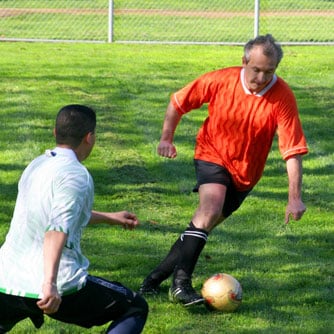A major risk factor for stroke, high blood pressure (hypertension) affects approximately 970 million people worldwide. Peter Krustrup, from the University of Exeter (United Kingdom), and colleagues recruited 33 men, ages 33 to 54 years, with mild to moderate hypertension, and randomly divided them in two groups: one took part in two hour-long soccer training sessions a week, while the other received usual care by a general practitioner including advice about the importance of physical activity and a healthy diet, together with control blood pressure measurements (control group). The effects on exercise capacity, maximal oxygen uptake, body fat and blood pressure, were monitored after three months and at the end of the six-month trial. For the soccer-playing group, average mean blood pressure was reduced by 10 mmHg, while the reduction was only 5 mmHg in the control group receiving the medical advice. For the football group, maximal oxygen uptake and maximal exercise capacity was improved by10%, resting heart rate decreased by 8 beats per minute and body fat mass dropped by an average of 2 kilograms. No significant changes to these health measures were observed in the control group. As well, the men who took part in soccer training were also found to be less physically strained during moderate intensity exercise. Writing that: ‘Six months of soccer training improved aerobic fitness, reduced blood pressure and resulted in an array of other favourable effects on cardiovascular risk profile for untrained middle-aged hypertensive men,” the study authors suggest that: “Soccer training may, therefore, be a better non-pharmacological treatment for hypertensive men than traditional physician-guided advice.”
Soccer Scores on Blood Pressure
Krustrup, Peter; Randers, Morten B.; Andersen, Lars J.; Jackman, Sarah R.; Bangsbo, Jens; Hansen, Peter R.. “Soccer Improves Fitness and Attenuates Cardiovascular Risk Factors in Hypertensive Men.” Medicine & Science in Sports & Exercise, 10 October 2012.




